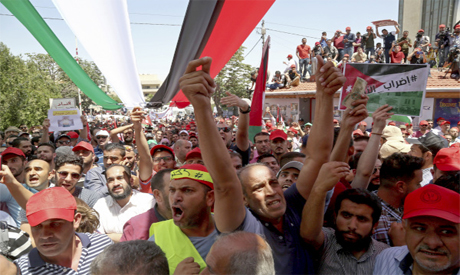
Jordanian protesters shout slogans during a demonstration outside the in front of the Labour Union office, in Amman, Jordan, Wednesday, June 6, 2018. (AP photo)
Shops and pharmacies closed in Jordan's capital on Wednesday as some unions pressed ahead with a strike protesting against tax hikes, after King Abdullah replaced the prime minister to defuse public anger.
A draft law to raise income taxes and IMF-driven reforms have sparked the largest protests in years in Jordan, a U.S. ally that has mostly escaped years of regional turmoil.
Rallies in Amman and other cities snowballed after more than 30 unions, representing tens of thousands of public and private sector employees, first went on strike a week ago.
But many unions pulled out of Wednesday's walkout after the king appointed Omar al-Razzaz, a former World Bank economist, on Tuesday to form a new government and urged talks over the law.
Harvard-educated Razzaz, education minister in the outgoing cabinet, replaces Hani Mulki and will now start consultations to form a new government.
"We will give the government a chance once it is formed, after that we will decide our next steps," union leader Ali al-Abous told Reuters.
Doctors', engineers' and lawyers' unions mainly took part in Wednesday's action, which drew smaller crowds than in recent days. Hundreds of men and women with flags and picket signs converged outside the headquarters of the Professional Unions Association.
"Our demands are clear and honest: cancelling the income tax law, because it affects every sector of society in Jordan," said Abdullah Kaisieh, a pharmacist at the rally.
Hospital workers staged a protest and some businesses shut down for a few hours, hanging signs that said "I'm taking part in the strike" but life in the capital mostly went on as usual.
Often seen as a unifying figure, the king said when appointing Razzazz that the new cabinet must review the entire system of taxation and immediately start a dialogue over the tax law with political parties, unions and civil society groups.
Public resentment has grown since the government ended bread subsidies and hiked the general sales tax earlier this year, under a plan driven by the International Monetary Fund to cut Jordan's $37 billion debt.
The government has said it needs funds for public services and argues the reforms will reduce social disparities by placing a heavier burden on high earners.
The king said some reforms had burdened Jordanians and called for better services, blaming regional instability for hampering the sluggish economy. His comments suggested the government could shelve the new tax law, which it sent to parliament last month, and slow the pace of price rises.
Lawmakers were on course to ask the king's permission for an early exceptional session, with a majority demanding the withdrawal of the tax law, the speaker of parliament has said.
Officials say Razzazz had been an opponent of reforms that hurt the poor. His appointment still sends a message to foreign donors that Jordan will press ahead with reforms, though in a gradual way, they said.
Overnight protests in Amman had brought hundreds of people onto the streets but the turnout was lower than the nights before. Police blocked the roads to stop them from reaching the Cabinet office.
"We don't want a change of names, we want a change in policy," said one banner. "Bring back bread subsidies," read another.
Some celebrated Mulki's resignation and said they would wait to see if price hikes they said were hitting the poor and squeezing the middle class were stopped.
"I personally feel optimistic and we started to feel the beginning of change," Murad Yaghan told Reuters at a late night protest as people around him chanted against the government's economic policies. "We will continue public pressure."
Short link: